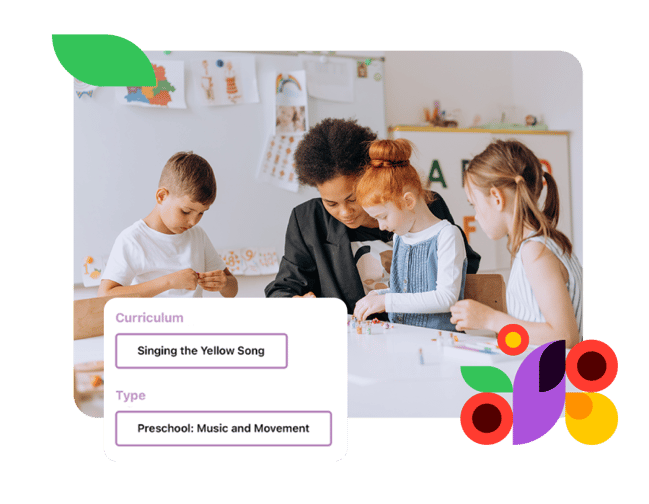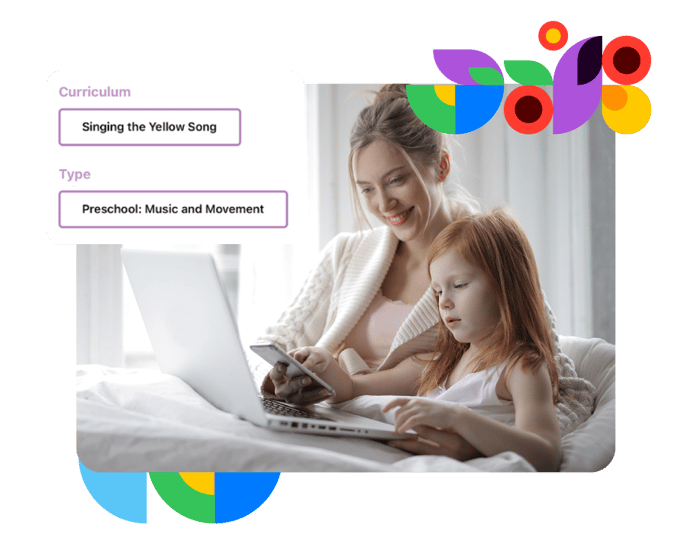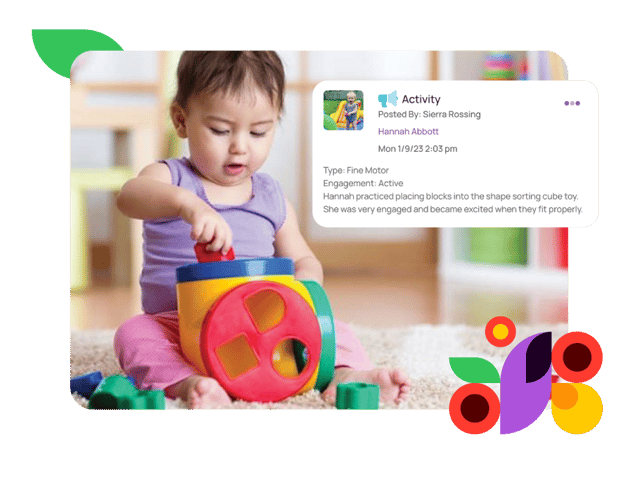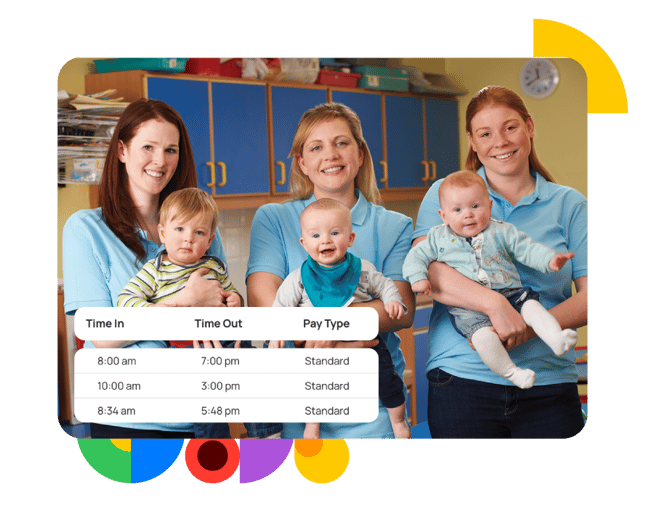When you’re training for a marathon, how do you know you’re improving? Are you tracking distance, speed, or how you feel?
All of these questions are assessments.
From tasting salt in a recipe to trying out a new stain remover, we’re always evaluating what is and isn’t working. In fact, these little evaluations are so ingrained into our daily lives, we may not even notice them.
Our assessment practices in early childhood education also require this kind of frequency and familiarity.
Because in early learning especially, assessments are crucial to understanding student growth, communicating with parents/caregivers, and creating responsive lesson plans that meet the needs of each individual child.
But when was the last time you did a deep dive into your preschool assessment practices?
If you can’t remember, the time is now! We’ll take you through all the reasons child development assessment is so important and break down the different options (including preschool assessment forms and examples you can actually use!).
Did you know that the right childcare management software can help you track learning progress, seamlessly connect with parents, and save administrators an average of 35 hours of teacher time per month, per center? True story! You can learn more about it right here.
Why Preschool Assessment Forms Matter
The importance of evaluation in preschool comes down to four major areas: student insight, parent/caregiver connection, curriculum, and data.
Think of it like four wheels on a car. If you’re missing even one, you won’t be able to get too far.
Before you dive into updating your preschool assessment forms and process, let’s take a closer look at each of these core areas.

Family
Gain insight into student growth.
At the fundamental level, assessing students in your preschool lets you know about their cognitive, social, emotional, and physical development.
But evaluating students at the pre-k level is unique from other educational experiences. Teachers are looking out for major developmental milestones, not academic achievements.
For example, preschool assessments may be focused on the following questions:
- Are the student’s fine motor skills on track with their developmental stage?
- Is the student communicating through verbal or physical means?
- How is the student responding to their peers?
Based on the insights revealed in the assessments, preschool teachers and team members can prepare to meet their students' needs more sensitively and accurately.
Create a connection with parents and caregivers.
Parents and caregivers are trusting you with their children for a significant portion of the day. It’s critical they have feedback on what’s going on while their child is in your care.
Preschool assessments can be the foundation for connecting with parents and caregivers while deepening trust within the wider school community — especially when your assessments are used intentionally and followed up with via a parent feedback survey.
Of course, preschool assessments can also be an avenue for careful behavior tracking and communicating with parents about patterns their child is showing that may warrant additional support or attention.
Simply put, as a preschool teacher or administrator, taking time to thoughtfully assess your students allows you to be an active and informed part of their lives.

Children learning a music and movement lesson
Shape engaging lessons and curriculum.
As an educator, you already know developmentally appropriate practice is key to helping students learn, engage, and grow at the right pace and level.
But how do you know what that level is if you’re not taking time to assess their learning progress?
The days of the cookie-cutter lessons and plowing through the material are over. With the right preschool assessments, you can fine-tune the curriculum and lessons for your students. Your center’s reputation will benefit too!
Responsive teaching shows you prioritize each student’s unique abilities (something parents love to see).

Curriculum
Collect powerful data.
Child development assessment forms, informal and formal evaluations, and consistent observation and documentation provide you with a valuable asset: data.
Data can be used to market your center to prospective families and recruit the best teachers and administrators. You can even use your data to help advance your ECE advocacy work.
A critical element of gathering data is its relationship to funding, especially for students who are considered disadvantaged. Rasmussen University explains it like this:
Early education centers with disadvantaged students — such as children from low-income families, foster children, or children who are learning English as a second language — may gain more funding from the state when they can prove academic progress with these students is closing the achievement gap.
Point blank: gather assessment data. The way you use it can influence your enrollment, staff, funding, and student outcomes.

Family data
What types of assessments do preschoolers take?
Education assessments boil down to two major categories: formal and informal.
You’ll also often hear the terms “summative” and “formative” in relation to school assessments.
We’re going to cover the basics of each so you can update your preschool assessment forms and practices with total confidence.
Formal assessments
- Often have a standardized measure or rubric
- Are planned in advance
Examples:
- Questionnaires
- Standardized testing
- Presentations
- Quizzes
Informal Assessments
- There is no formal metric or the teacher creates the metric of evaluation (it is not standardized across a state, for example)
- Can be pre-planned or spontaneous
Examples:
- Observations
- Demonstrations
- Drawings
Formative vs. summative assessments
Formative and summative assessments often align with informal or formal assessments, but it’s important to be clear on the purposes of each while you’re revamping your assessments.
| Formative | Summative | |
| Purpose | Monitor student learning continuously | Evaluate student learning at the end of a unit/period of time |
| Key Identifier | Happens daily, is often informal, and can take many forms | Is traditionally a formal assessment with a standardized grading/metric |
| Examples | Creating a drawing to demonstrate understanding, games, group projects | Final exam, performance, presentation |
In early childhood education in the United States, summative assessments aren’t traditionally used. Informal, formative assessments are often considered the best way to evaluate preschool students.
The Evolution of Preschool Assessment Forms: Where are we now?
As our understanding of child development has expanded, our relationship with pre-k assessments has changed too (thankfully!).
One modern point of view is that preschool assessment needs to encompass social-emotional learning (SEL), not just academic growth.
In 2014, an editorial published in The Atlantic highlighted how University of Chicago economist James Heckman prioritized SEL in his 1994 study:
He started looking into early childhood interventions, [and] he realized that assessments needed to include noncognitive outcomes…This insight — that teaching children how to learn can be just as important as the content of what they learn — has been one of two key developments in the area of early interventions.
We also now see an important recognition that preschool students are not the same as their six, seven, and eight-year-old counterparts. This thinking was pushed in 1998 when the Principles and Recommendations for Early Childhood Assessments were released. It advocated for many of the perspectives we still see in ECE today:
Because young children learn in ways and at rates different from older children and adults, we must tailor our assessments accordingly. Because young children come to know things through doing as well as through listening, and because they often represent their knowledge better by showing than by talking or writing, paper-and-pencil tests are not adequate…
For these reasons, how we assess young children and the principles that frame such assessments need special attention. What works for older children or adults will not work for younger children; they have unique needs that we, as adults, are obliged to recognize if we are to optimize their development.
Since the early 1990s, these schools of thought have only been strengthened. But do your assessment practices — and the forms you use to implement them — reflect our modern understanding of how young children develop?
Are you a fan of early learning history? Don’t miss our One Year in ECE series featuring major milestones like 1972’s Abecedarian Project, the genesis of Head Start, the history of the time out, and more!

Children working or playing
6 Ways to Improve Development with Pre-K Assessment Forms
Let’s breathe some new life into your center’s assessment tools and strategies.
These seven keys to better preschool assessments will help you revive your practice.
1) Embrace informal assessments.
Continuous observation is the way to go with early learners. Because they develop so quickly, informal assessments can help you keep up!
Track each student’s growth by documenting your observations. You can refer back to your observations later and create a growth overview for parents throughout the year.
2) Assess on a cycle.
For more formal or pre-planned observations, don’t wait until the end of the year. Assess your preschoolers at the beginning, middle, and end of your time with a student.
This way, you'll be able to see patterns in their growth much more clearly.
3) Go beyond academics.
Update your assessment forms to include social, emotional, and physical development. With young students, these are the progress areas that matter most.
Cognitive engagement is important, but it never operates in a vacuum. In fact, it becomes activated by the other development areas too!

Children playing
4) Consider your state guidelines and requirements.
Many states have guidelines, requirements, or preschool standards for educators to follow. Use them as a guide or tool to shape your curriculum, planning, and instruction.
We’ve pulled a handful of preschool assessment examples from across the US to give you an idea of what these may typically include:
- Maine Early Learning and Development Standards
- Georgia Department of Early Care and Learning’s Standards
- Michigan Early Childhood Standards of Quality for PreKindergarten
- Texas Prekindergarten Guidelines
- California Preschool Learning Foundations
5) Know the student.
Especially in preschool, assessments are deeply based on each individual student.
Since there usually isn’t a standardized metric, having someone who is not familiar with the student can result in inaccurate assessments and a big disservice to the child.
If necessary, allow your teachers and staff extra time to complete their assessments for the most accurate picture possible of each student’s progress.

Student playing an activity
6) Decide what you're assessing and how.
As outlined above, informal, formal, formative, and summative evaluations are all on the table when it comes to your preschool assessment forms.
To best serve your students, decide what you want to assess and how you want to do it.
Here are some factors to take into account:
- If you’re looking for a preschool standardized assessment to measure students, can the desired result be repeated by various children? If not, consider how reliable the assessment is.
- Is your assessment led by the student, instructor, or both?
- Do you want to collect assessments as part of a portfolio?
- Does your assessment method take into account each student’s unique background and abilities? Is it developmentally appropriate?
Modern Examples of Preschool Assessment Forms
We wouldn’t leave you just with theories about how to elevate your preschool assessments.
Access some of our favorite preschool assessment forms and resources below:
LineLeader by ChildcareCRM's Portfolio Moment
A portfolio is one of our favorite ways to assess student progress. At LineLeader, our Portfolio Moments are only visible to Teachers and Administrators, not parents. You can log observations or track milestone progression. Portfolios can be generated by your team, then shared with parents when you’re ready to give a progress update.

LineLeader moments
TeachingMama
If you’re looking to have a baseline — mid-year and end-of-year assessment form for letters and numbers — TeachingMama has created these excellent templates that will definitely fit the bill!
PreKinders
We love PreKinders’ blank outlines that you can easily customize for your students. These preschool assessment forms are flexible for use with small groups, scissors skills, and play!
Pre-K Printable Fun
Pre-K Printable Fun has an entire pack that you can use whether you’re a teacher or parent. It’s 74 pages full of resources and information!
National Association for the Education of Young Children (NAEYC)
NAEYC’s article on Documentation and Learning Stories opens up new ideas about culturally responsive and family-integrated assessments based on your unique students. Definitely a must-read for anyone interested in modernizing their preschool assessment practices!

Childcare staff
Assess for Success
Child development assessments can sometimes feel daunting, but try to see them as the opportunity for empowerment that they are.
With the right preschool assessment forms, you’ll gain insight into student growth, have a clear guide for curriculum development, and develop a firm foundation for parent connection.
Not only that, assessments provide important data for marketing, recruitment, advocacy, and funding. But the greatest part of assessing preschoolers is that the process can be creative, play-based, and above all — fun!
At LineLeader, we believe that intentional technology can empower educators and tangibly improve the lives of the young children in their care. And as a major bonus, it can also make life as an administrator much easier.
If you’re looking for modern ways to streamline your center operations, you can learn more with a totally free, no-strings-attached demo.
Not a User Yet?
Schedule a free demo to lead your childcare team to a brighter tomorrow - with LineLeader.
Already a User or Simply Want to Learn More?
Check out our staff retention guide to equip your team with supportive tools!


.png?width=352&name=Untitled%20design%20(49).png)


